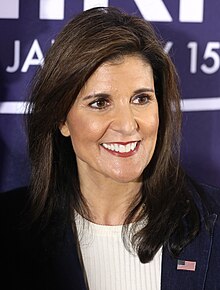Former President Donald Trump has once again stirred controversy, this time by mocking former South Carolina Governor Nikki Haley‘s birth name, “Nimarata,” in a recent social media post on his platform Truth Social. The move is seen as part of a broader pattern of racially charged attacks against Haley, echoing Trump’s past involvement in “birther” conspiracy theories.
Born Nimarata Nikki Randhawa in 1972, Haley has been a prominent figure in Republican politics, serving as the Governor of South Carolina from 2011 to 2017. However, her Indian heritage has been a target for certain factions within the Republican Party, particularly aligned with Trump.
In his latest post, Trump repeatedly referred to Haley as “Nimbra,” deviating from her commonly used middle name, “Nikki.” This deliberate use of her birth name is viewed by many as an attempt to emphasize her Indian roots, a tactic previously employed by Trump in other political contexts.
This incident comes at a critical time as Haley is actively participating in the 2024 Republican nominating contest, seeking to position herself as a viable alternative to Trump. The New Hampshire primary is just days away, and Trump’s attack on Haley’s name is seen as a strategic move to undermine her campaign.
Haley, no stranger to attacks on her heritage, responded by dismissing Trump’s comments, attributing them to insecurity. She pointed to Trump’s excessive spending on TV ads and his erratic behavior as signs that “something’s wrong.” Despite Trump’s victory in the Iowa caucuses, Haley remains determined to compete strongly in New Hampshire, using it as a launchpad for the upcoming South Carolina primary.
Trump’s fixation on Haley’s name is not new. Far-right online forums have previously discussed her given name alongside racist commentary and false “birther” claims, falsely asserting that she is ineligible for the presidency due to her parents’ citizenship at the time of her birth.
Social media discussions on the left have also scrutinized Haley’s name and family background, questioning her stance on racism in America. This underscores the complex dynamics of identity politics and how they play out in the political arena, with both sides leveraging or challenging aspects of a candidate’s background for their own narratives.
Accusations of racially charged attacks against Haley are growing, prompting a closer examination of Trump’s tactics and their impact on the Republican primary. The use of racial and ethnic identity as a political tool has deep implications for the broader discourse within the party and the country at large.
As the 2024 race unfolds, the spotlight on Haley’s heritage raises questions about the role of identity politics in shaping electoral outcomes. It also highlights the challenges faced by candidates who navigate a political landscape where personal backgrounds are scrutinized, sometimes weaponized, in the pursuit of political objectives.
The accusations of racially charged attacks against Haley further contribute to the ongoing debate about the direction of the Republican Party and the role of divisive rhetoric in shaping its future. The impact of these dynamics on the broader political climate remains a subject of intense scrutiny as the nation heads into a critical election cycle.











